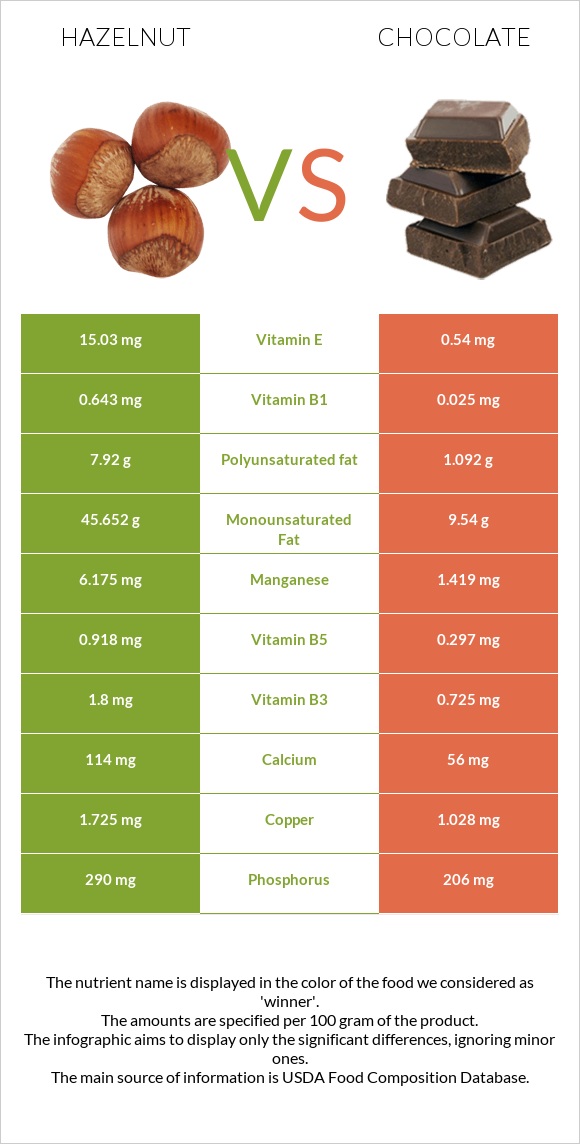Hazelnut vs. Chocolate — In-Depth Nutrition Comparison
Compare
Important differences between hazelnut and chocolate
- Hazelnut has more manganese, vitamin E, copper, vitamin B1, vitamin B6, vitamin B5, phosphorus, and fiber; however, chocolate is richer in iron.
- Hazelnut's daily need coverage for manganese is 207% more.
- Hazelnut contains 28 times more vitamin E than chocolate. Hazelnut contains 15.03mg of vitamin E, while chocolate contains 0.54mg.
- Hazelnut contains less saturated fat.
The food varieties used in the comparison are Nuts, hazelnuts or filberts and Chocolate, dark, 45- 59% cacao solids.
Infographic

Infographic link
Mineral Comparison
Mineral comparison score is based on the number of minerals by which one or the other food is richer. The "coverage" charts below show how much of the daily needs can be covered by 300 grams of the food.
| Contains more MagnesiumMagnesium | +11.6% |
| Contains more CalciumCalcium | +103.6% |
| Contains more PotassiumPotassium | +21.6% |
| Contains more CopperCopper | +67.8% |
| Contains more ZincZinc | +21.9% |
| Contains more PhosphorusPhosphorus | +40.8% |
| Contains less SodiumSodium | -100% |
| Contains more ManganeseManganese | +335.2% |
| Contains more IronIron | +70.6% |
| Contains more SeleniumSelenium | +25% |
Vitamin Comparison
Vitamin comparison score is based on the number of vitamins by which one or the other food is richer. The "coverage" charts below show how much of the daily needs can be covered by 300 grams of the food.
| Contains more Vitamin CVitamin C | +∞% |
| Contains more Vitamin EVitamin E | +2683.3% |
| Contains more Vitamin B1Vitamin B1 | +2472% |
| Contains more Vitamin B2Vitamin B2 | +126% |
| Contains more Vitamin B3Vitamin B3 | +148.3% |
| Contains more Vitamin B5Vitamin B5 | +209.1% |
| Contains more Vitamin B6Vitamin B6 | +1240.5% |
| Contains more Vitamin KVitamin K | +75.3% |
| Contains more FolateFolate | +∞% |
| Contains more Vitamin AVitamin A | +100% |
| Contains more Vitamin B12Vitamin B12 | +∞% |
All nutrients comparison - raw data values
| Nutrient |  |
 |
DV% diff. |
| Manganese | 6.175mg | 1.419mg | 207% |
| Vitamin E | 15.03mg | 0.54mg | 97% |
| Monounsaturated fat | 45.652g | 9.54g | 90% |
| Copper | 1.725mg | 1.028mg | 77% |
| Saturated fat | 4.464g | 18.519g | 64% |
| Vitamin B1 | 0.643mg | 0.025mg | 52% |
| Polyunsaturated fat | 7.92g | 1.092g | 46% |
| Fats | 60.75g | 31.28g | 45% |
| Iron | 4.7mg | 8.02mg | 42% |
| Vitamin B6 | 0.563mg | 0.042mg | 40% |
| Folate | 113µg | 28% | |
| Protein | 14.95g | 4.88g | 20% |
| Carbs | 16.7g | 61.17g | 15% |
| Phosphorus | 290mg | 206mg | 12% |
| Vitamin B5 | 0.918mg | 0.297mg | 12% |
| Fiber | 9.7g | 7g | 11% |
| Caffeine | 0mg | 43mg | 11% |
| Vitamin B12 | 0µg | 0.23µg | 10% |
| Choline | 45.6mg | 8% | |
| Vitamin C | 6.3mg | 7% | |
| Vitamin B3 | 1.8mg | 0.725mg | 7% |
| Calcium | 114mg | 56mg | 6% |
| Vitamin B2 | 0.113mg | 0.05mg | 5% |
| Vitamin K | 14.2µg | 8.1µg | 5% |
| Calories | 628kcal | 546kcal | 4% |
| Magnesium | 163mg | 146mg | 4% |
| Potassium | 680mg | 559mg | 4% |
| Zinc | 2.45mg | 2.01mg | 4% |
| Cholesterol | 0mg | 8mg | 3% |
| Sodium | 0mg | 24mg | 1% |
| Selenium | 2.4µg | 3µg | 1% |
| Net carbs | 7g | 54.17g | N/A |
| Sugar | 4.34g | 47.9g | N/A |
| Starch | 0.48g | 0% | |
| Vitamin A | 1µg | 2µg | 0% |
| Trans fat | 0.112g | N/A | |
| Tryptophan | 0.193mg | 0% | |
| Threonine | 0.497mg | 0% | |
| Isoleucine | 0.545mg | 0% | |
| Leucine | 1.063mg | 0% | |
| Lysine | 0.42mg | 0% | |
| Methionine | 0.221mg | 0% | |
| Phenylalanine | 0.663mg | 0% | |
| Valine | 0.701mg | 0% | |
| Histidine | 0.432mg | 0% | |
| Fructose | 0.07g | 0g | 0% |
| Omega-3 - EPA | 0g | 0.001g | N/A |
| Omega-3 - ALA | 0.085g | N/A | |
| Omega-6 - Eicosadienoic acid | 0g | 0.001g | N/A |
| Omega-6 - Linoleic acid | 0.947g | N/A |
Macronutrient Comparison
Macronutrient breakdown side-by-side comparison
| Contains more ProteinProtein | +206.4% |
| Contains more FatsFats | +94.2% |
| Contains more WaterWater | +447.4% |
| Contains more OtherOther | +34.7% |
| Contains more CarbsCarbs | +266.3% |
Fat Type Comparison
Fat type breakdown side-by-side comparison
| Contains less Sat. FatSaturated fat | -75.9% |
| Contains more Mono. FatMonounsaturated fat | +378.5% |
| Contains more Poly. FatPolyunsaturated fat | +625.3% |
Carbohydrate type comparison
Carbohydrate type breakdown side-by-side comparison
| Contains more StarchStarch | +∞% |
| Contains more GlucoseGlucose | +∞% |
| Contains more FructoseFructose | +∞% |
| Contains more SucroseSucrose | +1001.2% |
| Contains more LactoseLactose | +∞% |
~equal in
Maltose
~0g
~equal in
Galactose
~0g





